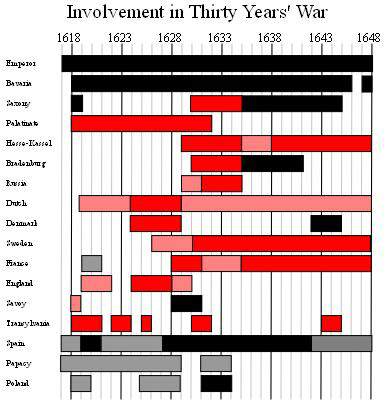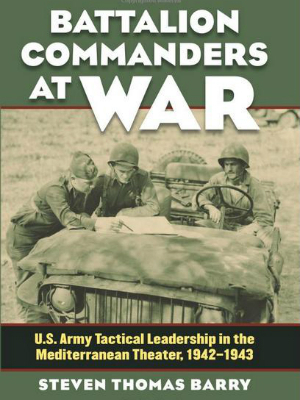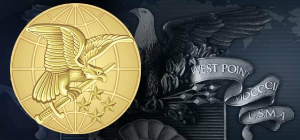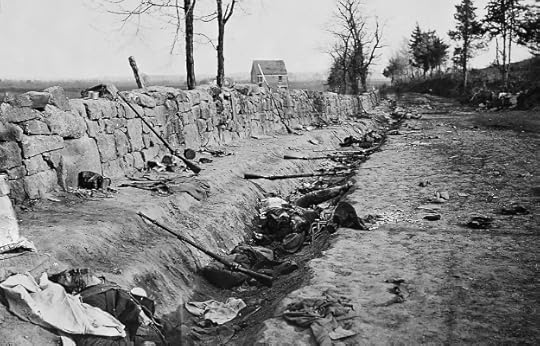Thomas E. Ricks's Blog, page 98
June 28, 2013
Rebecca's War Dog of the Week: Night Ops in Bagram with Tex

By Rebecca Frankel
Best Defense Chief Canine Correspondent
Adding to our
Summer Postcard Series is the above photo of MWD Tex and his handler, Staff
Sgt. Steven Owen, from the 455th Expeditionary Security Forces Group, conducting
a night operations search at a Traffic Control Point (TCP) outside of Bagram Airfield on
April 28. Working TCPs are a fundamental part of an MWD team's
assignment -- for bomb- and drug-sniffing dogs -- especially if their deployment
includes patrolling larger military bases or working in and out of urban areas.
TCPs "provide an
unpredictable security posture" and handlers like Owen and dogs like Tex
select random vehicles and sweep them "for contraband and all occupants
[are] identified and checked."
Rebecca Frankel is special projects editor at FP.
June 27, 2013
500 years from now, will history remember the USSR primarily as an ally of the United States?

It just might. Think about it: A historian trying to reach
across the centuries might think that, sure, they had some jostling for more
than four decades, but they never actually went to war with each other -- and,
as it turned out, the most significant moment for the world in their relationship
was when they were allies, from 1941 to 1945.
Truth be told, it likely was the Commies who were the most
important partner. As Max Hastings writes in Winston's War, "Though the United States was by far the strongest global
force in the Grand Alliance, the Soviet Union mobilised raw military power more
effectively than either Western partner." On the other hand, the Soviet Union
lasted about three-score and ten years, the lifetime of one person,
according to the Bible. In the history books, that's a blip -- not so much an
empire as a sustained tantrum.
Is Syrian-related violence the beginning of the Muslim world's Thirty Years' War?

By
John T. Kuehn
Best
Defense guest columnist
The so-called "Arab Spring" has now turned into
a larger Mideast autumn that is reflecting warfare and conflict approaching the bloody religious
wars that Europe went through during the 16th and 17th centuries.
We are seeing the beginning of a wider regional
war along the Tehran-Baghdad-Damascus axis and beyond -- not an "axis of evil,"
but rather an axis of instability and conflict. It could go further, linking to
similar areas of violence to the east (in Afghanistan-Pakistan) or to the west
to the mess in Saharan and sub-Saharan Africa. Instead of democracy breaking
out everywhere, it seems that war is breaking out everywhere. Syria is the nexus for the current
dangerous inflection point. It is in many ways similar to the Netherlands of
the 16th century, that area of rebellion against the Hapsburgs/Catholic Church
that rocked the world for over 80 years as the Reformation swirled about.
As we all know, voices are clamoring in
Washington to "make it go away." Or rather to make the critics of the Obama
administration quiet down. Most recently, Secretary of State John Kerry argued
for airstrikes on airfields reputedly being used by the Assad regime for combat
missions, including chemical weapons attacks. Kerry's proposal was vetoed
during a recent principals meeting at the White House by none other than
General Martin Dempsey, chairman of the Joint Chiefs of Staff. So much for
war-mongering generals. Additionally, in recent months, Hezbollah has entered
the conflict with thousands of fighters to help retake the city of Qusayr from
the Syrian insurgents. Today, Qusayr is a ghost town with fewer than 500
inhabitants. Recall, too, that Hezbollah are the same bubbas that brought us
the Marine Barracks attack in 1983. Reports out today indicate that the Lebanese
Army has had several firefights with local Sunnis who support the Syrian
rebels. Just great, a re-ignition of the Lebanese civil war might be in the
offing.
Moving to the east we find the "sectarian
violence" in Iraq at levels not seen since the American surge in 2007. Could
yet another civil war be igniting there -- this time absent the armed umpiring
of the United States and its allies? It may already have. The link here is
precisely Iran's support for the Assad regime and its client quasi-state farther
south, Hezbollah. From a purely military standpoint, Tehran's line of communication
with its political allies and co-religionists farther west in Syria and Lebanon
runs directly through Iraq. This "rat line" is used by the Quds Force and the
Iranian Revolutionary Guard Corps and has been in place in various forms ever
since the U.S. invasion in 2003. See David Crist's recent book The
Twilight War if you doubt me on this issue. The sectarian violence in
Iraq is directly related to the Syrian violence -- make no mistake. One way for
the insurgents' co-religionist Sunni allies in Iraq to influence events in
Syria is to destabilize the pro-Iranian government in Baghdad. In this way they
can interrupt the flow of Iranian support to both Hezbollah and Assad through Iraq.
Afghanistan? There is no need for further
discussion; war continues there and is likely to continue -- although the
political ties of Tehran to Kabul may strengthen given President Karzai's
recent strong denunciation of U.S. efforts to include the Taliban in peace
talks. Too, Iran's oil goes to India, which is also a supporter of the Kabul
regime, all of which makes Pakistan the odd man out and more likely to support
Sunni co-religionists and political allies represented now by insurgents in
both Syria and Iraq.
What about further west? Let's see, Egypt has
severed diplomatic ties with Syria, never a good sign. Further south, in the
always pleasant Horn of Africa, we find U.N. personnel have been blown up in
Mogadishu by al Shabab. Although clear linkages to the conflict to the
northeast do not exist, the forces behind this latest attack on the
international order are of a religious bent that favors the insurgent-Sunni
factions. Too, this sort of violent outburst does nothing to improve the
stability of this entire region. Farther west we find the arc of instability
running along the Maghreb (Tunisia and Algeria) as well as splitting south
through Libya to troubling events in Mali and Nigeria; the latter country is
itself in a low state of civil war divided along ethno-religious lines. Finally,
to the north of it all is the NATO ally and Sunni co-religionist government of
Turkey, warily eying the troublemaking regime of Vlad Putin, which supports
Syria. But Turkey is now distracted by widespread, Westernized demonstrations
against its own attempts to impose religious conservatism. None of this can be comforting
for the major powers, which all have a stake in the Middle East and Africa. Get
the picture? Heated outbursts to quiet political audiences are probably -- as
Dempsey pointed out to Secretary Kerry -- ill-advised.
This regional conflict is not just about
religion, nor is it all about longstanding political relationships and ethnic
tensions -- it is all of the above. I am compelled to ask, what should the
United States do that it is not
already doing? This presupposes I know the range of action the U.S. government
is already engaged in, but I would suggest these steps -- whatever they are -- are
probably sufficient for now. Those who predicted the Arab Spring turning into a
messy regional war were right. It has
arrived.
This is the time for calm heads to prevail and
avoid a much larger general war, but first we must recognize the real potential
for this mess to turn into something along the lines of Europe's own wars
of religion, something like the grim and destructive
Thirty Years' War that began with a "Prague Spring" in 1618.
John T. Kuehn has taught military history at the Command
and General Staff College since 2003 and retired from the Navy as a commander
in 2004. He earned his Ph.D. in history from Kansas State University in 2007.
He graduated with distinction from Naval Postgraduate School in 1988. He won
the Society of Military History Moncado Prize in 2010 and is the author of
Agents
of Innovation
(2008),
Eyewitness
Pacific Theater
(with D.M.
Giangreco, 2008), and numerous articles and editorials.
From the Best Defense mailbag: Barry's book on WW II battalion commanders

Today's
mailboat brings Battalion
Commanders at War: U.S. Army Tactical Leadership in the Mediterranean Theater,
1942-1943, by Steven Thomas Barry.
It
looks very interesting. I've long been struck by the apparent paradox that battalion
command is an important level of command -- the first level at which an officer
has a staff, perhaps the last at which he actually might close with the enemy,
as Barry puts it -- but there are so few good books about it.
June 26, 2013
2 questions for the 'Sentinel': Is terrorism getting boring? Does that mean we won?

Those are
the two questions that occurred to me when I saw the table of contents of the new issue of West Point's Sentinel.
I think the answers are "yes" and "maybe." But
my CNAS colleague Phil Carter rejoined that the two answers
instead are "no" and "probably yes":
You may not be interested in
terrorism, but terrorism is still interested in you.
As the wars in Iraq and
Afghanistan end/cycle down, I suspect we'll see the US embrace a post-war
variant of counterterrorism strategy which is heavier on law enforcement and
intelligence, lighter on military, and heavily reliant on international
relationships and organizations (like INTERPOL and foreign liaison services)
for its reach. And we will also return to a view of terrorism that treats it
more like international criminal activity than belligerent activity, and
responds in kind. Query whether that approach will be sufficient, particularly
given advances in technology (i.e. 3D printing + autonomous vehicles +
proliferation of CBRNE) which will enable terrorist groups to act with more
lethality than ever."
I must say,
I learn more at CNAS than I have a right to.
Here's the
ToC in question:
The June issue contains the
following articles:
- The Renewed Threat of Terrorism to Turkey
By Stephen Starr
- The Local Face of Jihadism in Northern Mali
By Andrew Lebovich
- Boko Haram's Evolving Tactics and Alliances
in Nigeria
By Jacob Zenn
- A Profile of Khan Said: Waliur Rahman's Successor in the Pakistani Taliban
By Daud Khattak
- Tweeting for the Caliphate: Twitter as the
New Frontier for Jihadist Propaganda
By Nico Prucha and Ali Fisher
- Rebellion, Development and Security in
Pakistan's Tribal Areas
By Hassan Abbas and Shehzad H. Qazi
- Peace with the FARC: Integrating
Drug-Fueled Guerrillas into Alternative Development Programs?
By Jorrit Kamminga
- Recent Highlights in Terrorist Activity
A captain in Afghanistan asks: Why are we so scared of letting women into combat?

By Capt. Michael Carvelli, U.S. Army
Best Defense guest columnist
The secretary of
defense and the chairman of the Joint Chiefs of Staff issued a memorandum to
eliminate the 1994 Direct Ground Combat Definition and Assignment Rule in
January. I just received a memo today, which was written in April.
The 1994 rule states,
"Service members are eligible to be assigned to all positions for which they
are qualified, except that women shall be excluded from assignment to units
below the brigade level whose primary mission is to engage in direct combat on
the ground, as defined as: direct ground combat is engaging an enemy on the
ground with individual or crew served weapons, while being exposed to hostile
fire and to a high probability of direct physical contact with the hostile
force's personnel. Direct ground combat takes place well forward on the
battlefield while locating and closing with the enemy to defeat them by fire,
maneuver, or shock effect."
Fast forward to
today (or April, since I am behind): The current directed timeline is an additional
6,000 positions in 26 active/National Guard brigades and Special Operations
Aviation will be opened. Last year, over 14,000 positions were opened in
brigade combat teams for women to work in maneuver battalion headquarters.
No later than
December 2015, the secretary of the Army is directing an assessment of the
effects and development of gender-neutral standards, and the effectiveness of
the strategies to integrate women into new career opportunities. The result is
integration not later than January 1, 2016.
Generally speaking,
the waterfall effect will start with field artillery and combat engineers, then
into armor and infantry. Special Forces and Special Operations are yet to be
determined at this point in time.
The Air Force
elevated their sexual assault prevention officer from a lieutenant colonel to a
major general, a switch from male to female included. Brigadier General Laura
Richardson was the first female division deputy commander of the 1st Cavalry
Division. General Ann Dunwoody was the first woman to achieve the rank of general
in the military (among other glass-ceiling breaking achievements). Further
back, the first black female command sergeant major was in 1974.
Interesting to note
that in 1989, Captain Linda Bray led her military police company in Panama
defending a dog kennel. Remember the name Molly Pitcher? In 1778, she was
carrying water when her husband collapsed and she took control of the cannons. Even
Jessica Lynch was a supply clerk when her company drove the wrong way and she
was captured in 2003.
Are we really
incorporating women into combat, or just coming to the realization that they
have been in combat, just not the way in which we envision or define? I have
six women in my engineer company and four of them have performed combat
missions day after day. The definition from 1994 of combat is not completely
in-line with counterinsurgency, but its intent is well received. These four
women conduct route clearance, searching for improvised explosive devices on
routes every day. Three of them signed up to operate horizontal equipment like
bulldozers and dump trucks. The other is an officer, technically not a combat
engineer, but no engineer officer specializes only in combat engineering.
Nowhere in their contract did it say "to perform engineer missions, except
those which involve direct combat." They are out doing the same tasks as their
male counterparts. They drive vehicles, shoot crew-served weapons, and lead soldiers
for every mission.
With these six women
in my company, I have yet to have a sexually related incident and I hope I
never do. We have received a lot of guidance on sexual assault and sexual
harassment in the last few weeks. I never accepted sexually related activities
as part of my company. I do not enforce the standard any harder than I had
before Congress put the spotlight on the military. I have been unwavering in my
stance: It has no place in my life, my soldiers' lives, or in my company.
The male soldiers in
my company have verbalized no issues with any of the women in the company. We
are doing well as an integrated team. Yes, there are men, and yes, there are
women. No one wears blinders or tries to ignore each other's gender. We just
fill the gaps where needed. One of my drivers sits on a foam roll because she
is short. She is not a bad driver, she is just height disadvantaged.
Looking forward to
the next few years, as glass ceilings shatter and the military better
integrates men and women, will the sexual assault cases increase? Will the
incorporation of men and women into all occupations lead them to treating each
other equally? I hope so. I've tried digging into the numbers when the service
academies allowed women through their gates. Maybe someone with that data can
publish it for trending.
Since officers and
non-commissioned officers are grown, will we be waiting until the year 2020 to
see a female infantry company commander, or 2035 to see a female armor battalion
command sergeant major? When will we see a female brigade combat team commander?
2040?
CPT Michael Carvelli is an engineer officer
currently deployed in Afghanistan. This article represents his own personal
views and not those of the engineer regiment, the U.S. Army, the Department of
Defense, nor the U.S. government.
Congratulations to Tim O'Brien

For winning the $100,000 Pritzker Prize for a lifetime of achievement in writing about military affairs. It is a good and interesting choice,
after rewarding a bunch of historians, to select a novelist.
I hope the money is tax-free!
June 25, 2013
The Best Defense interview: Former Defense Secretary Perry on what to do about North Korea's weapons program

This interview with
former Defense Secretary William Perry was conducted by telephone on June 20, 2013,
and is running today to commemorate the 63rd anniversary of the beginning of
the Korean War.
Best Defense: How close
did we come to military action against North Korea in
1994
? Did you think it was going to happen?
William
Perry: "First of all, we were never planning initiating an attack against North Korea. They might have
thought we were, but we were not....
"I
was very much concerned that the actions we were taking -- we were about to
take sanctions and make heavy reinforcements in South Korea -- that North Korea
would see it" [as an attack]. "It would have been a war they started, not one
that we started."
BD: So at the time did
you think there would be war?
WP:
"I didn't think so. But even more than now, we knew little about North Korea.
So we were very concerned that we didn't know what was going on there."
In
addition, "We had drawn a very public and very explicit red line, that they
would not process plutonium or that we would take some action." [So there was a
possibility of] "a surgical strike" [against their nuclear facilities. But
before that happened, there were several steps: Perry would have to recommend
the strike to the president, the president would have to approve it, and South
Korea would need to be brought in.] "There were a lot of ifs."
BD: How big would that
strike have been? How many aircraft, how many precision-guided munitions?
WP:
"We were not planning aircraft, we were planning conventional cruise missiles,
and only against the reprocessing facility."
BD: How many cruise
missiles?
WP:
"I don't remember. The accuracy of these missiles is such that I don't believe,
then or now, it would take many."
BD: How have your views
of North Korea changed since then?
WP:
"Well, we've learned a lot about North Korea since then.... It is very clear to
me now what I believed then but wasn't sure about, which is that they didn't
want a war with the United States."
BD: How have you
advised the Obama administration about how to handle North Korea?
WP:
"I don't feel qualified to advise them today.... In 1994, I was in the middle
of it. I am not in that position now.... [So] I am willing to suggest
alternatives to consider, but I will not say, ‘This is what you should do,'
because I am not well-informed enough to do that."
BD: Do you think North
Korea's leadership will ever give up nuclear weapons?
WP:
"I would never say never, but I certainly understand it is more difficult to
give up nuclear weapons than it was in 1994.... I think the turning point was
in 2002, 2003, when they actually reprocessed plutonium. To my mind, that was a
very serious red line. I think it was a whole new ballgame after that."
BD: What should we be
doing now?
WP:
[My preference is the "3 No's" -- that is, no new nuclear weapons, no improved
nuclear weapons, and no export of nuclear weapons.] "Until we get those being
negotiated, then it is feckless to be talking about a policy of eliminating
nuclear weapons.
I don't think we should give up that objective of eliminating North Korean
nuclear weapons. I just don't think it is a viable negotiating position today."
BD: What else should we
be doing? Are there more aggressive steps you'd like to see?
WP:
"I think we should be taking stronger measures to keep them from
developing ICBMs.... We still have that opportunity. They have to test
ICBMs to ensure they are effective. I believe our strategy ought to be to keep
them from developing a successful ICBM."
Navy acquisition captain gets bounced for playing pattycake with female contractor

But the Navy says the relationship the officer,
who is a computer network acquisition manager, had with her didn't sway the decision
in the June 30 award of a $4.5 billion network contract.
OK. But I have never
seen any organization truly able to investigate itself thoroughly when it comes
to sex, money, and the abuse of power. A second opinion is probably needed.
Churchill on Civil War staff rides

You must see the ground; you must cover the distances in person; you must measure the rivers and see what the swamps were really like.
--Winston
Churchill, "Old Battlefields of Virginia," Daily Telegraph,
December 16, 1929, about walking the sites around Richmond and Fredericksburg, as
quoted on page 121 of Martin Gilbert, Churchill
and America.
Thomas E. Ricks's Blog
- Thomas E. Ricks's profile
- 437 followers



